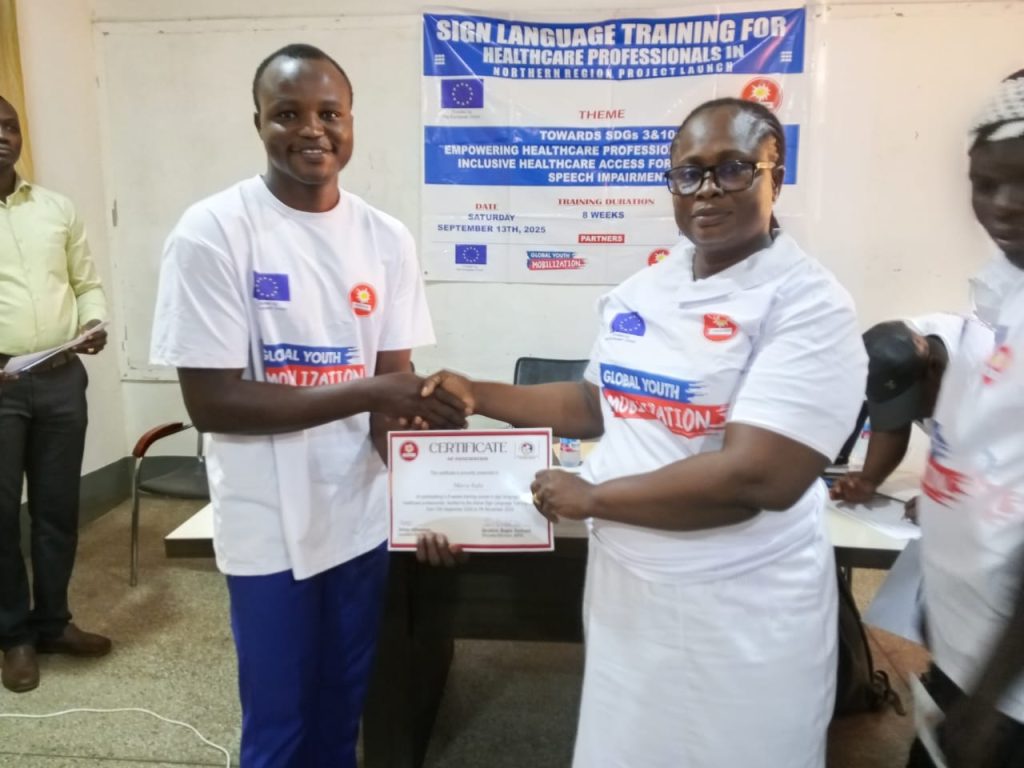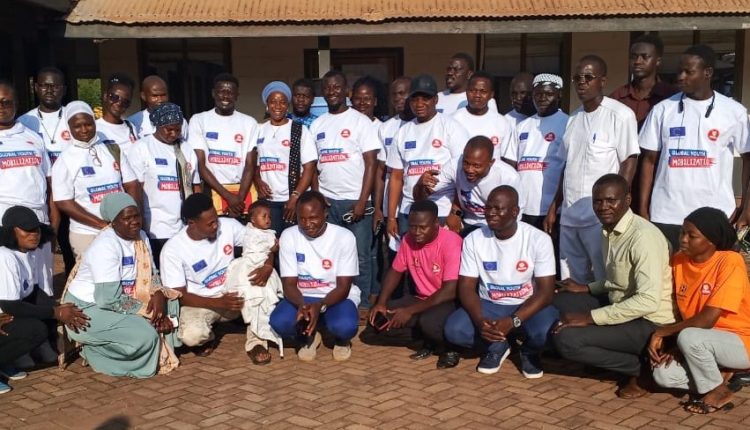CEDEPA Empowers Health Workers with Sign Language Skills to Promote Inclusive Healthcare in Northern Region
The Centre for Development and Policy Advocacy (CEDEPA), in collaboration with the Northern Regional Health Directorate, has completed an eight-week training programme in Ghanaian Sign Language for 25 frontline healthcare workers from five health facilities in the Northern Region.
The initiative, dubbed “Hear Our Sign Language: No More Barriers to Communication,” and supported by Global Youth Mobilization and its Big Six family, sought to bridge the communication gap between healthcare providers and persons with hearing and speech impairments — ensuring equitable access to healthcare services in Ghana.
Speaking at the closing ceremony held at the Tamale Disability Centre, Mr. Aminu Gafaru, Project Lead at CEDEPA, commended participants for their dedication and perseverance throughout the training. He described their achievement as a milestone in advancing inclusive healthcare delivery.
“You have not only acquired a new language but embraced a powerful tool for inclusion and empathy. Let these skills become a bridge—ensuring no patient is left unheard, unseen, or misunderstood because of a communication barrier,” she said.
Mr.Gafaru also called on the Ministry of Health and the Ghana Health Service to institutionalize sign language training across all healthcare facilities in Ghana, emphasizing that inclusion should be a permanent feature of the country’s healthcare system.
A Call for Inclusive Health Policy
In a Press statement, CEDEPA highlighted that effective communication is central to quality healthcare delivery, yet many Ghanaians who are deaf or hard of hearing face significant barriers when accessing medical care.
“We at CEDEPA wish to make a strong call on the Ministry of Health to institutionalize inclusive healthcare services for persons with hearing impairment across all health facilities in Ghana,” the statement read.
CEDEPA urged the Ministry to:
- Integrate sign language training into pre-service and in-service healthcare training programmes.
- Designate at least one trained sign language interpreter in every health facility as a focal person for hearing-impaired patients.
- Develop policy guidelines and protocols promoting disability inclusion in healthcare delivery.
“This is not a matter of charity or goodwill; it is a matter of rights, equity, and justice,” the statement emphasized, referencing Ghana’s Persons with Disability Act (Act 715) and the UN Convention on the Rights of Persons with Disabilities.

Stakeholder Endorsements
Representing the Tolon District Hospital, Hajia Failatu Yahaya Iddi, Nurse Manager and Deputy Director of Nursing Services, lauded CEDEPA for its visionary initiative, noting that inclusivity in healthcare is a right, not a privilege.
“Inclusive healthcare is not a favour we extend—it is a right we uphold. Our newly trained professionals have become ambassadors of that right. They have shown that empathy can be taught and that healing begins with understanding,” she said.
The Northern Regional Director of Health Services, Dr. Crysantus Kubio, commended CEDEPA for complementing the efforts of the Ghana Health Service in promoting disability inclusion.
“The regional health directorate is committed to ensuring that no one is left behind in accessing healthcare. We are working to make our facilities more inclusive for persons with disabilities,” Dr. Kubio assured.
Voices from Trainees
Participants shared how transformative the training had been:
Hussein Kubra, a nurse from Tolon Hospital, said, “It has really helped us to communicate with people who are unable to speak when they come to the hospital. We’ve even created spaces to train other health professionals so they can benefit too.”
Isaka Daniel Hafiz of the Savelugu Municipal Hospital added,
“From the beginning, we wondered if we could actually do this. But as the training progressed, it became more interesting and impactful. Just yesterday, a colleague was able to interpret for a deaf patient — it was so inspiring.”
Mr. Ibrahim Bapio Sumani, Founder and Director of the Active Sign Language Training Centre (ASTC), expressed gratitude to CEDEPA, the Ghana Health Service, and all partners for championing the inclusion of sign language in healthcare.
“Sign language is a powerful tool for communication and inclusivity. When you learn sign language, you not only help the deaf but also help yourself to remove communication barriers. You have done well with your eight-week course — congratulations,” he said.
Mr. Sumani further encouraged participants to pursue an additional one-month national assessment for certification, assuring that ASTC would coordinate the process.
“Together, we can create a more accessible and compassionate healthcare system,” he concluded.
Sustainable Development Goals (SDGs) Alignment
The “Hear Our Sign Language” project contributes directly to SDG 3 (Good Health and Well-being), SDG 10 (Reduced Inequalities), and SDG 17 (Partnerships for the Goals), reinforcing Ghana’s commitment to inclusive and equitable health services.
The ceremony ended with the presentation of certificates to the trained healthcare professionals, symbolizing a renewed commitment to promoting inclusive healthcare delivery in Ghana.
Acknowledgement of Partners and Support
Project is funded by the European Union in partnership with the Global Youth Mobilisation Fund.
Source: Ibrahim Angaangmeni Alhassan/zaaghana.com


